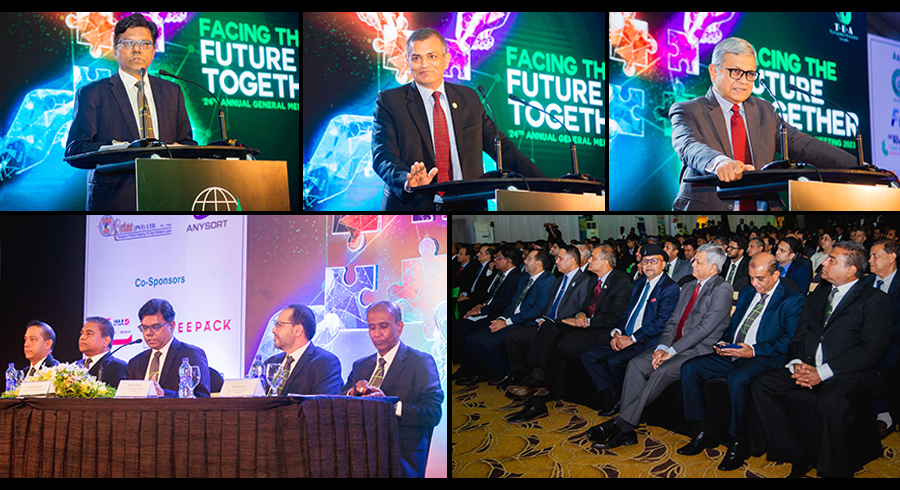The AGM, which took place at the Grand Marquee, Taj Samudra, showcased the resilience of the Sri Lankan tea industry amidst global challenges. Mr Vimalendra Sharan, FAO Resident Representative in Sri Lanka and Maldives, was present as the Chief Guest at the occasion,
With unanimous endorsement of the membership, Mr Ganesh Deivanayagam was re-elected for his second tenure as the Chairman of TEA, during the AGM.
Commenting, he remarked,
“I am pleased to serve a second term as Chairman, and take this opportunity to thank our membership for placing their faith and trust in my leadership.
Over what has been a challenging few years, both domestically and externally, including difficulties in importing raw materials and a high-tax environment, Sri Lanka has sustained its tea export revenues and continues to lead, as a direct result of positive action, stakeholder symbiosis and prudent decision-making.
This now gives us a stable platform on which to continue to build our resilient industry.”
Highlighting Sri Lanka’s unique position in the global tea market he added,
“Sri Lanka specializes in unique tea blends, helping it excel in the marketplace.
The average FOB price for Sri Lankan tea is US Dollars 5.10 per kg, compared to India’s $3.58 and Kenya’s $2.60.
Thus, Sri Lanka remains the largest revenue owner of tea in the world, second only to China.
Sri Lanka has achieved this feat through relentless pursuit, breaking global barriers, innovating, and taking risks.”
He also emphasized that Sri Lanka’s tea blending, packaging, flavouring and value addition are significantly ahead of its competitors.
Mr Niraj De Mel, Chairman of the Sri Lanka Tea Board also shared his insights saying,
“Our target is to touch at least 265 million kilos of tea production this year,” while emphasizing the need for sustainability amidst price fluctuations.
He also referred to discussions held with Minister of Plantation Industries, the Hon. Dr Ramesh Pathirana, with regard to increasing value addition, highlighting that Sri Lanka’s ability to produce a variety of teas, due to its diverse agro-climatic growing districts, could be more fully leveraged through value addition.
“Sri Lanka produces 3.9% of the global tea supply, with China and India being the other major producers,” Mr De Mel continued,
“However, we believe that more can be done with the variety of teas produced in Sri Lanka, particularly in terms of adding value and attracting new markets.
Ceylon Tea is unique and we may not be leveraging that distinction sufficiently.”
Mr Vimalendra Sharan, FAO Resident Representative in Sri Lanka emphasized the need to look after the welfare of tea smallholder farmers and other tea workers at the end of tea value chain.
Globally, smallholder farmers produce more tea than the large plantation companies, he said, but climate change and its impact on the tea sector is also a concerning factor when it comes to sustainability of the industry.
Explaining further, Mr Sharan added,
“Ceylon Tea is niche, it’s not mass market, and that’s where Sri Lanka can capitalize, and add value not just to the product but to the lives of producers.
Also, consumers are changing their views, and the trend towards healthy options, and ethical and sustainable production, especially in more sophisticated markets, where Ceylon Tea is prized, is growing.
So, the industry must focus on these areas, along with digital enablement and marketing, which is crucial for survival in the future.”
The state of the industry was also discussed at the AGM event.
Accordingly, the statistics for January to July 2023 indicate promising growth in tea production, with a total of 155.82 million Kg, an increase of 2.59 million Kg compared to the same period in 2022.
The application of fertilizer after a lapse of about two years has been a key factor in this increase.
In terms of exports, despite facing global challenges, Sri Lanka’s tea exports showed resilience.
Cumulative exports for January to July 2023 totalled 134.99 million Kg, with an FOB value of Rs. 1,827.58 per kg, reflecting an increase of Rs. 431.84 compared to the previous year.
Tea export revenue for the first half of 2023 reached USD 635.5 million, an impressive 10% increase from the same period in 2022.






















